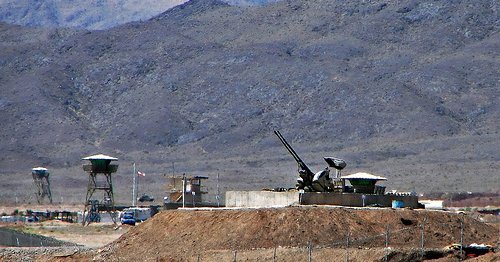The assassinations of the Rev. Martin Luther King Jr. and Robert F. Kennedy. And, on Christmas Eve, the flight of Apollo 8 from the Earth to the moon, bringing humanity its first glimpse of our single, borderless, breathtaking planet, lonely and fragile and whole, suspended among the blazing stars.
Yet the 1968 anniversary that we celebrate today [1] may have consequences greater than any of these. Forty years ago, in Washington, London and Moscow, world leaders signed the Treaty on the Non-Proliferation of Nuclear Weapons (NPT). The grand bargain of the NPT was that the non-nuclear weapon states agreed never to produce or acquire nuclear weapons, and the nuclear weapon states agreed eventually to get rid of theirs.
On July l, 1968, our government committed itself to negotiate the elimination of its entire nuclear arsenal – and, with the other nuclear weapon states, to abolish nuclear weapons from the face of the Earth forever.
our government committed itself to abolish nuclear weapons from the face of the Earth forever
Indeed, the nuclear weapon states have repeatedly restated their intention to fulfil that promise. The treaty entered into force in 1970. At the 25-year NPT Review Conference in 1995, the nations committed again “to systematic and progressive efforts to reduce nuclear weapons globally, with the ultimate goal of eliminating those weapons”.
At the 30-year NPT Review Conference in 2000, the commitment was reiterated. And the World Court concluded unanimously that the NPT had created “an obligation to pursue in good faith and bring to a conclusion negotiations leading to nuclear disarmament in all its aspects”.
And so the great issue facing the NPT regime today is how much longer the “have-nots” will keep their end of the bargain if the “haves” do not even move toward fulfilling theirs. The evidence of recent history – and common sense – is not promising.
The Bush administration has concentrated enormous diplomatic firepower on keeping North Korea and Iran from acquiring nuclear weapons. However, at the same time, it is proceeding to build a “reliable replacement warhead” that will eventually replace every nuclear warhead category in the US arsenal. And during its first year in office, in its “Nuclear Posture Review”, it set in motion plans to deploy a new long-range missile to deliver nuclear weapons in 2020, a new submarine to deliver nuclear weapons in 2030, and a new long-range heavy bomber to deliver nuclear weapons in 2040 – just in time for the 2045 centennial of the dawn of the atomic age.
We may, in the next decade or so, see the elimination, at last, of every nuclear weapon from the face of the Earth. Alternatively, we may see the nuclear weapon states continue indefinitely to stall. If they do, several non-nuclear weapon states will almost certainly give up on the NPT bargain, and will set us on the road toward l0, 15 or 25 nuclear weapon states.
That will provide that many more opportunities for a nuclear warhead to find its way into the hands of a non-state nuclear terrorist. Or for a hot political crisis between nuclear-armed adversaries to spin wildly out of control. Or for some rogue military officer to push the nuclear button out of malevolence or mental unbalance. Or for a nuclear warhead to be launched utterly by accident.
The basic choice remains, as Albert Einstein and Bertrand Russell put it in 1955, “stark and dreadful and inescapable” – a world with dozens of nuclear weapon states, or the alternative of a nuclear weapon-free world. A world with a few nuclear “haves” and a great many nuclear “have-nots” cannot forever endure.
The original article has been publish on The Federalist Debate, n. 1, 2009.

Follow the comments: |
|
